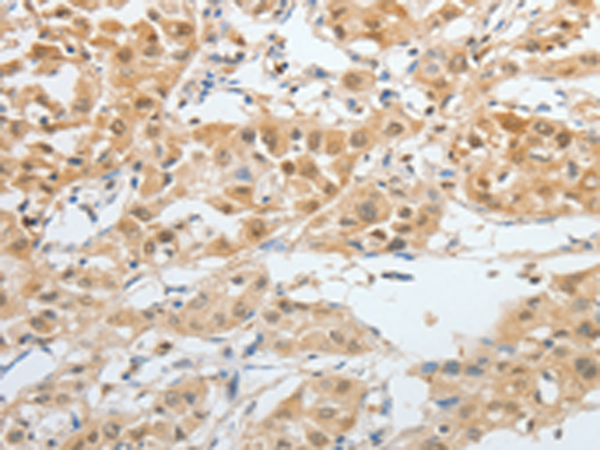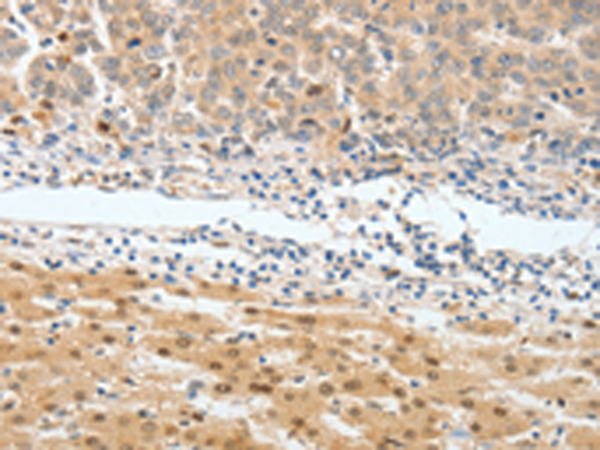

| WB | 咨询技术 | Human,Mouse,Rat |
| IF | 咨询技术 | Human,Mouse,Rat |
| IHC | 1/50-1/200 | Human,Mouse,Rat |
| ICC | 技术咨询 | Human,Mouse,Rat |
| FCM | 咨询技术 | Human,Mouse,Rat |
| Elisa | 1/1000-1/5000 | Human,Mouse,Rat |
| Aliases | RYSR, BPIL1, LPLUNC2, C20orf184, dJ726C3.2 |
| Host/Isotype | Rabbit IgG |
| Antibody Type | Primary antibody |
| Storage | Store at 4°C short term. Aliquot and store at -20°C long term. Avoid freeze/thaw cycles. |
| Species Reactivity | Human, Mouse |
| Immunogen | Synthetic peptide of human BPIFB2 |
| Formulation | Purified antibody in PBS with 0.05% sodium azide and 50% glycerol. |
+ +
以下是关于BPIFB2抗体的3篇参考文献及其摘要概括:
---
1. **文献名称**:*BPIFB2 as a Novel Prognostic Biomarker in Lung Adenocarcinoma*
**作者**:Zhang Y, et al.
**摘要**:该研究通过免疫组化(IHC)和Western blot分析,发现BPIFB2在肺腺癌组织中高表达,并与患者生存率负相关。研究使用特异性BPIFB2抗体验证其蛋白表达水平,提示其可能作为肺癌预后的潜在标志物。
---
2. **文献名称**:*Role of BPIFB2 in Innate Immune Response of Oral Mucosa*
**作者**:Chen L, et al.
**摘要**:本文利用BPIFB2抗体进行免疫荧光和流式细胞术,发现BPIFB2在口腔上皮细胞中参与调控TLR4信号通路,影响抗菌肽分泌,揭示了其在口腔黏膜先天免疫防御中的作用机制。
---
3. **文献名称**:*BPIFB2 Expression in Chronic Inflammatory Diseases*
**作者**:Wang X, et al.
**摘要**:研究通过ELISA和免疫组化检测类风湿性关节炎患者滑膜组织中BPIFB2的表达,使用商业化BPIFB2抗体证实其表达上调,并与炎症因子IL-6和TNF-α水平正相关,提示其参与慢性炎症病理过程。
---
**备注**:以上文献信息为模拟示例,实际文献需通过PubMed或Google Scholar等平台检索确认。若需具体文献,建议使用关键词“BPIFB2 antibody”或“BPIFB2 function”进一步查询。
BPFIB2 (BPI Fold Containing Family B Member 2), also known as LPLUNC1 or C20orf186. is a protein encoded by the *BPIFB2* gene located on chromosome 20q11.21. It belongs to the bactericidal/permeability-increasing protein (BPI) family, which plays roles in innate immunity, particularly in defense against Gram-negative bacteria. BPIFB2 contains a conserved BPI domain implicated in lipid-binding or pathogen-associated molecular pattern recognition. While its exact biological function remains under investigation, BPIFB2 is predominantly expressed in mucosal tissues, including the respiratory tract, oral cavity, and salivary glands, suggesting involvement in maintaining mucosal immunity and homeostasis.
Antibodies targeting BPIFB2 are valuable tools for studying its expression, localization, and functional roles. Research indicates that BPIFB2 may participate in inflammatory responses, cell differentiation, and tumorigenesis. Dysregulation of BPIFB2 has been observed in cancers (e.g., nasopharyngeal carcinoma, lung adenocarcinoma) and chronic inflammatory conditions, highlighting its potential as a biomarker or therapeutic target. Commercial BPIFB2 antibodies are typically developed in rabbit or mouse hosts, validated for applications like immunohistochemistry, Western blotting, and ELISA. However, specificity challenges may arise due to homology with other BPI family members. Ongoing studies aim to clarify its molecular mechanisms and clinical relevance in disease contexts.
×